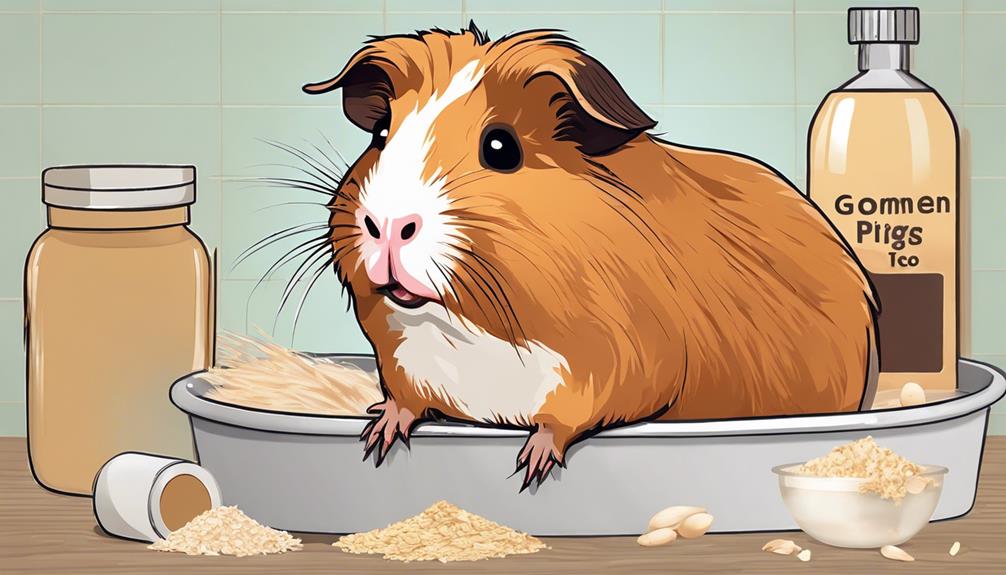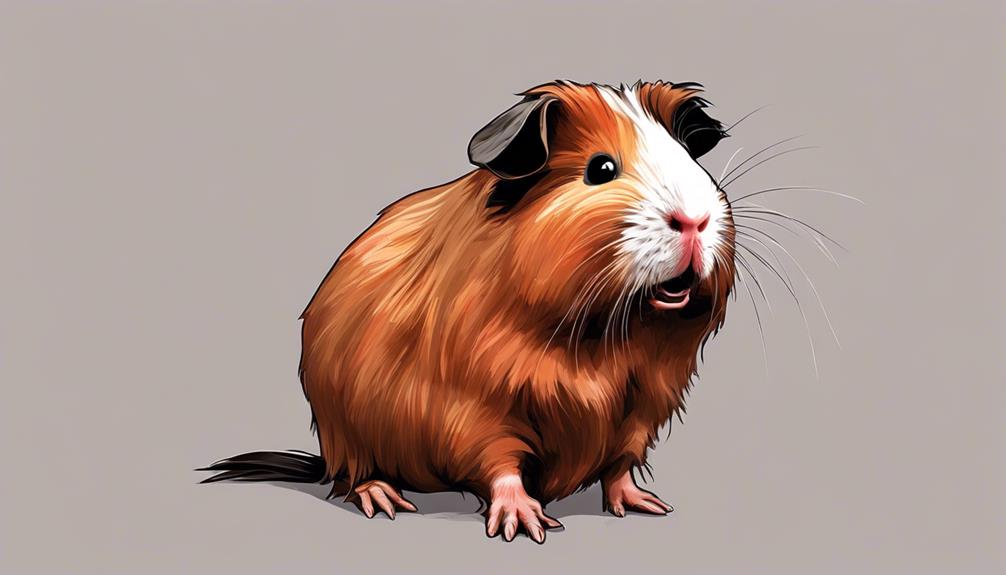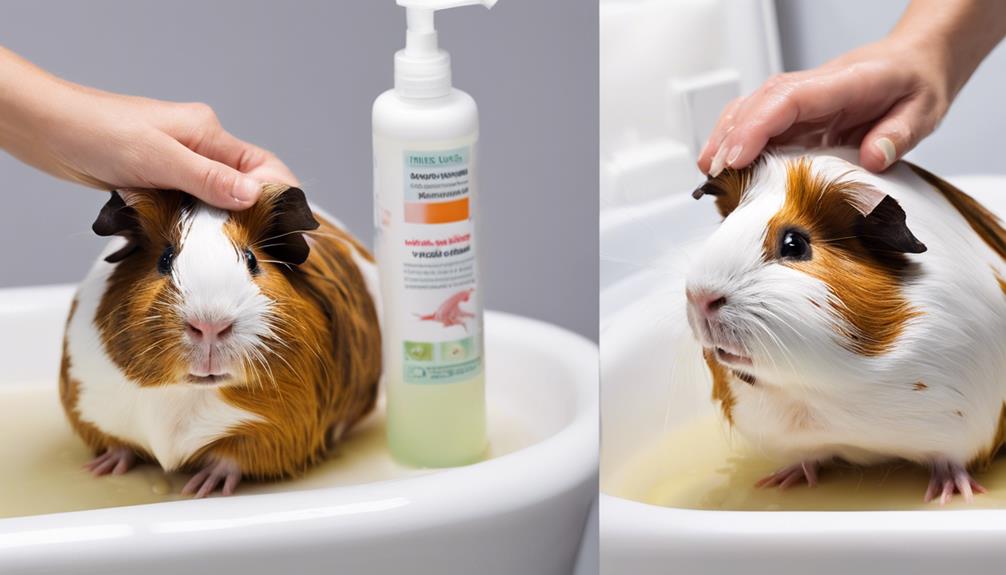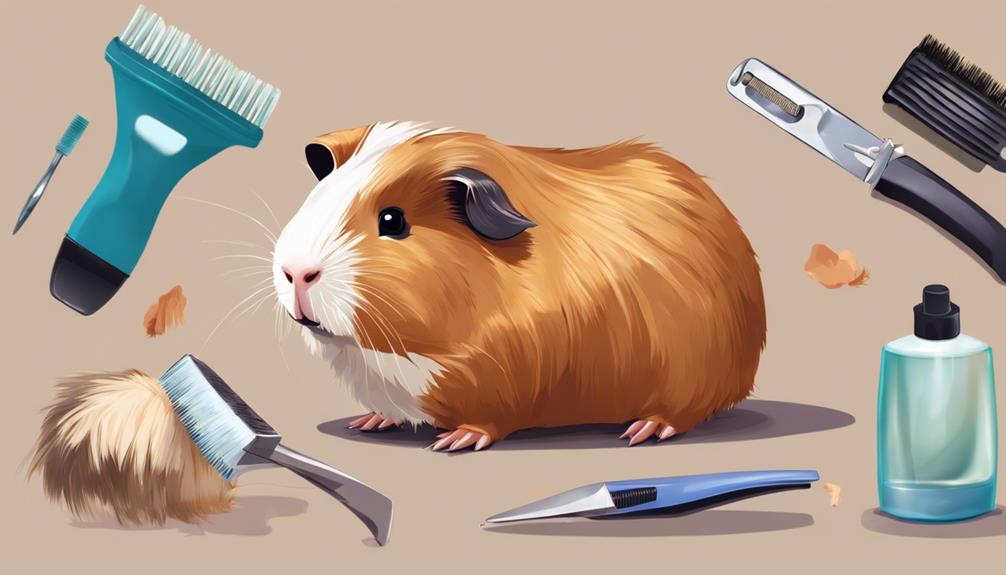How to Handle Common Skin Conditions in Guinea Pigs

Guinea pigs are prone to several common skin conditions, such as mites, fungal infections, and abscesses. These issues can cause discomfort and distress to your pet if left untreated. Regularly checking your guinea pig's skin for any abnormalities is essential for early detection and treatment.
Mites are a common skin issue in guinea pigs and can cause intense itching and hair loss. A vet can diagnose mites through a skin scraping and prescribe appropriate treatment, usually in the form of topical medication. Fungal infections, such as ringworm, can also occur in guinea pigs and typically present as circular, scaly patches on the skin. Treatment involves antifungal medication and thorough cage cleaning to prevent reinfection.
Abscesses are pockets of pus that can develop under the skin due to infections or injuries. These require veterinary attention for drainage and antibiotics to clear up the infection. Always consult a vet if you notice any skin problems in your guinea pig to ensure proper diagnosis and treatment. Regular grooming, a clean living environment, and a balanced diet can help prevent many skin issues in guinea pigs.
Key Takeaways
- Regular skin checks and early detection are crucial for managing common skin conditions in guinea pigs.
- Use gentle products, maintain hygiene, and provide a balanced diet to support guinea pig skin health.
- Promptly address signs like hair loss and redness to prevent discomfort and distress in guinea pigs.
- Consulting a vet, following treatment plans, and post-treatment monitoring are vital for handling skin conditions effectively.
Understanding Guinea Pig Skin Anatomy
Guinea pigs possess a unique and delicate skin structure that requires attentive care and consideration. Proper Guinea pig skin care is essential for maintaining their dermatological health. These small creatures have sensitive skin that's prone to irritation and injury, making it important to handle them with care. When tending to their skin, it's important to use gentle products specifically formulated for Guinea pigs to avoid any adverse reactions.
To guarantee proper dermatological health maintenance, it's advisable to bathe Guinea pigs occasionally using mild shampoos designed for small animals. Regular grooming with a soft brush can help prevent matting of their fur and promote circulation, keeping their skin healthy. Additionally, providing a clean living environment and a balanced diet rich in Vitamin C is key to supporting their skin health from the inside out.
Identifying Common Skin Conditions
Understanding the signs and symptoms of common skin conditions in guinea pigs can help caregivers provide timely and appropriate care for their furry companions. When it comes to identifying skin conditions in guinea pigs, caregivers should look out for:
- Hair Loss: Sudden or patchy hair loss could indicate an underlying skin issue.
- Redness or Inflammation: Skin that appears red or inflamed may signal irritation or infection.
- Scabs or Sores: The presence of scabs or sores on the skin may indicate a bacterial or fungal infection.
- Excessive Scratching: Guinea pigs that scratch excessively may be experiencing discomfort due to a skin condition.
- Thinning Skin: Skin that appears thin or fragile could be a sign of an underlying health issue.
To prevent skin conditions in guinea pigs, maintaining a regular skin care routine and practicing preventive measures is crucial. By observing these common signs, caregivers can promptly address any skin issues their beloved guinea pigs may be facing.
Symptoms of Mites in Guinea Pigs

Mites in guinea pigs can cause significant discomfort, leading to itching and hair loss. One of the key symptoms to watch for is skin scabs, which can indicate a mite infestation.
If you notice these signs in your guinea pig, seeking veterinary care promptly is crucial to address the issue.
Mites Cause Itching
When dealing with itching in their furry companions, many guinea pig owners may notice a range of symptoms that could be indicative of mites.
- Signs of Mites in Guinea Pigs:
- Scratching excessively
- Hair loss in specific patches
- Redness or irritation on the skin
- Presence of tiny moving dots on the fur
- Restlessness or discomfort
Mite prevention is essential for guinea pig care to maintain their skin health and overall well-being. Providing proper housing, regular cage cleaning, and avoiding contact with other infested animals can help prevent mite infestations. Quick action is critical for itch relief and to prevent further discomfort in these gentle pets.
Hair Loss From Mites
To address hair loss from mites in guinea pigs, owners should pay close attention to specific symptoms that indicate a potential infestation. Mites are tiny parasites that can cause significant discomfort to our furry friends. Owners can prevent mite infestations by ensuring proper hygiene and regular veterinary check-ups.
If hair loss is observed, it's essential to consult a veterinarian promptly for accurate diagnosis and treatment. Hair loss management involves treating the underlying mite infestation with appropriate medications prescribed by a professional. Additionally, maintaining a clean living environment for the guinea pig can help prevent mites from recurring.
Skin Scabs Indicate Mites
An important indicator of mites in guinea pigs is the presence of skin scabs, signaling potential discomfort and the need for prompt attention from owners. Here are key points to ponder when dealing with skin scabs that indicate mites:
- Treating skin scabs: Gentle cleansing with a mild shampoo can help soothe the affected areas.
- Preventing mites: Regularly clean and sanitize your guinea pig's living space to reduce the risk of mite infestations.
- Identifying mite infestations: Look for signs like intense scratching, hair loss, and crusty skin to catch mites early.
- Seeking treatment: Consult a veterinarian for proper diagnosis and treatment options to address mites effectively.
- Maintaining hygiene: Regular grooming and health checks can aid in preventing future mite issues.
Treating Fungal Infections in Guinea Pigs

Fungal infections in guinea pigs can manifest in various ways, including bald patches, scaly skin, and excessive itching.
Treatment options for fungal infections may include antifungal medications, topical creams, and improving the guinea pig's living environment to prevent further spread.
It's crucial to consult a veterinarian for a proper diagnosis and tailored treatment plan to guarantee the guinea pig's well-being.
Fungal Infection Symptoms
Symptoms of a fungal infection in guinea pigs may manifest as changes in their skin, fur, or overall behavior. When observing your guinea pig for signs of a fungal infection, look out for:
- Patchy hair loss
- Scaly or crusty skin
- Redness or irritation
- Excessive scratching or itching
- Unusual behavior such as lethargy or decreased appetite
To make certain your guinea pig's living environment is clean and dry. Regularly clean their cage, provide fresh bedding, and avoid damp or humid conditions. Additionally, maintaining proper hygiene by keeping your guinea pig's skin moisturized can help prevent dry skin, reducing the risk of fungal infections.
Treatment Options for Fungi
To effectively address fungal infections in guinea pigs, maintaining a clean and dry living environment is paramount. Alongside this essential step, natural remedies like diluted apple cider vinegar baths can help combat fungal growth. Antifungal creams prescribed by a veterinarian are also important in treating these infections.
When caring for a guinea pig with a fungal infection, gentle handling and regular monitoring of their skin condition are essential. Creating a cozy and stress-free environment for your furry companion can aid in their recovery process. If the infection persists or worsens, seeking vet recommendations promptly is advised.
Preventing Dry Skin in Guinea Pigs
To prevent dry skin in your guinea pig, guarantee their enclosure is kept at an appropriate humidity level and provide them with a balanced diet rich in vitamin C and hydration. Ensuring these factors are in place will help maintain your guinea pig's skin health and overall well-being.
Here are some tips to prevent dry skin in guinea pigs:
- Environmental Factors: Keep the humidity level in their enclosure between 30-70% to prevent skin dehydration.
- Diet Recommendations: Include fresh vegetables like bell peppers and kale in their diet to boost their vitamin C intake, essential for healthy skin.
- Hydration Tips: Make sure your guinea pig always has access to fresh, clean water to stay hydrated.
- Moisturizing Techniques: Consider using a guinea pig-safe moisturizer or coconut oil to hydrate their skin if it appears dry.
- Regular Health Checks: Monitor your guinea pig's skin condition regularly and consult a vet if you notice any signs of dryness or irritation.
Importance of Proper Hygiene

Proper hygiene plays an essential role in maintaining the health and well-being of your guinea pig. Regular bathing and skin wipes help keep your guinea pig's skin clean and free from dirt and bacteria. However, excessive bathing can strip their skin of natural oils, so it's important to find the right balance. Skin wipes can be a convenient alternative for spot cleaning between baths.
Ensuring cleanliness in your guinea pig's living environment is equally important. Regularly cleaning their cage and using suitable bedding types help prevent skin issues caused by bacteria and parasites. Opt for bedding materials like paper-based or aspen shavings, avoiding cedar and pine which can be harmful to your pet's skin and respiratory system.
Here is a simple guide to help you maintain proper hygiene for your guinea pig:
| Aspect | Recommendation | Frequency |
|---|---|---|
| Bathing | Use guinea pig-safe shampoo | Once a month |
| Skin Wipes | Cleanse gently with guinea pig-safe wipes | As needed |
| Cage Cleanliness | Change bedding and clean cage thoroughly | Weekly |
| Bedding Types | Opt for paper-based or aspen bedding | As needed |
Consulting a Veterinarian
Maintaining your guinea pig's health includes seeking guidance from a veterinarian to address any skin conditions effectively. When it comes to skin health and seeking professional advice, consulting a veterinarian is essential. Here are some key points to take into account:
- Skin condition prevention: Veterinarians can provide valuable insights on how to prevent common skin conditions in guinea pigs through proper hygiene practices and a balanced diet.
- Veterinary guidance: A veterinarian can accurately diagnose any existing skin issues your guinea pig may have, making sure the most appropriate treatment plan is implemented promptly.
- Regular check-ups: Schedule regular visits with a veterinarian to monitor your guinea pig's overall health and catch any potential skin problems early on.
- Medication management: Veterinarians can prescribe safe and effective medications to treat skin conditions and alleviate any discomfort your guinea pig may be experiencing.
- Follow-up care: After receiving treatment, follow-up with your veterinarian as advised to guarantee the skin condition is improving and to address any concerns that may arise.
Tips for Maintaining Healthy Skin
Ensuring the health of your guinea pig's skin starts with incorporating simple yet effective practices into their daily care routine.
Skin hydration is key; provide fresh water daily and consider using a spray bottle to lightly mist your guinea pig to help keep their skin hydrated.
When it comes to grooming techniques, regular brushing with a soft brush can help remove loose hair and prevent matting, promoting healthy skin.
Additionally, making sure your guinea pig's diet is rich in Vitamin C through fresh vegetables like bell peppers and broccoli can contribute to healthy skin.
Dietary considerations are important; make sure your guinea pig has a balanced diet to support skin health. If needed, consult with a veterinarian about incorporating vitamin supplements into their diet.
Frequently Asked Questions
Can Guinea Pigs Get Sunburned and What Can I Do to Protect Their Skin From the Sun?
Under the glaring sun, guinea pigs can indeed get sunburned. To protect their delicate skin, applying pet-safe sunscreen and ensuring they have access to shady areas are essential. Preventing sunburn is key to their well-being.
Are There Any Specific Shampoos or Grooming Products That Are Safe for Guinea Pig Skin?
When it comes to guinea pigs, it's important to use gentle shampoos and grooming products. Incorporating these items into their skin care routines can help maintain a healthy coat and prevent potential skin issues.
How Often Should I Trim My Guinea Pig's Nails to Prevent Skin Irritation?
To maintain healthy skin and prevent irritation, it is crucial to trim a guinea pig's nails every 3-4 weeks. This grooming routine keeps nails at a safe length, reducing the risk of scratching and potential skin issues.
Can Guinea Pigs Develop Allergies That Affect Their Skin, and How Can These Be Managed?
Skin allergies in guinea pigs can impact their skin health. Treatment involves identifying triggers and avoiding them. Prevention through a clean environment and appropriate diet is essential. Regular vet check-ups can help manage skin conditions effectively.
Are There Any Dietary Supplements or Specific Foods That Can Help Improve the Overall Health of a Guinea Pig's Skin?
Skin supplements can enhance a guinea pig's skin health. A nutritious diet rich in vitamin C, essential fatty acids, and antioxidants supports healthy skin. Offer foods like bell peppers, leafy greens, and high-quality pellets to promote skin wellness.











